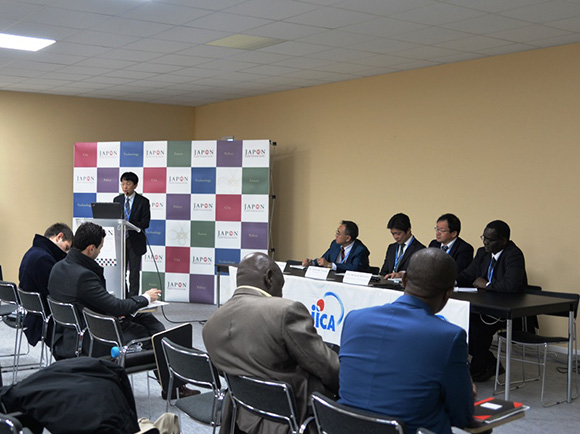Efforts by Japan's Public Private Partnership toward the REDD+ Initiative
Japan International Cooperation Agency (JICA); Forest and Forest Product Research Institute; Japan Public-Private Platform for REDD+
Outline
Demonstration projects for REDD+ in developing countries and Developments of technical methodology for REDD+ are promoted by Japan with the development of “Japan’s Public-Private Platform for REDD+ (JP3-REDD+)”. This event is held to report following activities from both public and private sectors toward REDD+ of Japan and to discuss the outlook for REDD+ now and in the near future.
- Activities on REDD+ looking ahead next commitment period (after 2020) by Japan
- Forest conservation activities with public private partnership
- Expectation of developing country toward Japan
Program
-
- Effort for REDD+ initiative by public sector
- Mr. Kenichi Shishido, Deputy Director General, Global Environment Department, JICA
-
- Effort for REDD+ initiative by private business sector
- Mr. Shinsuke Yazaki, Energy Department, Kanematsu Corporation
-
- Challenges and expectation for REDD+ by developing countries
- Dr. Inthavy Akkharath, Deputy Director General, Department of Forest Resources Management, Ministry of Natural Resources and Environment, Lao PDR
Mr. Kenichi Shishido (on behalf of representative of Kenya) Deputy Director General, Global Environment Department, JICA
-
- Panel Session
-
- [Panelist]
- Mr. Kenichi Shishido
Mr. Shinsuke Yazaki
Dr. Inthavy Akkharath
Mr. Omedi Moses Jura, Engineer, National Climate Change Secretariat, Ministry of Environment, Water and Natural Resources, Republic of Kenya
- [Moderator]
- Mr. Yuki Okada, Assistant Director, Forestry & Nature Conservation Group, Global Environment Department, JICA
Summary
"Japan's Public-Private Platform for REDD+ (JP3-REDD+)" was established in 2014 and cooperation generated by JP3-REDD+ has led to better levels of readiness support and the development of improved technical methodologies for REDD+. During this session, activities for REDD+ were reported together with; a look ahead towards the next commitment period (after 2020), forest conservation activities with public private partnerships, expectations of Japan from the viewpoint of developing countries, and a discussion regarding REDD+ in the near future.
Mr. Shishido (JICA) explained JICA's efforts toward REDD+, which included a briefing on a technical cooperation project in Vietnam. Mr. Yazaki (Kanematsu Corp.) introduced a JCM-REDD+ project for promoting cacao farms in Gorontalo Province, Indonesia. Dr. Inthavy (Laos) also explained a JICA project and stated an expectation for future JCM-REDD+. Due to Mr. Omedi's, late arrival, the presentation for Kenya was made by Mr.Shishido who explained the future direction of JICA's cooperation with REDD+, on his behalf.
During the panel session, the discussion centered on the significance of private business sector participation in the REDD+ initiative. Laos and Kenya commented that they strongly expected private business sector participation to fill any gaps for capital demand. In response, Kanematsu stated; 1) It would be difficult for the private business sector to implement REDD+ for the sole purpose of CSR, 2) Their project was able to obtained acceptance within the company due to its capacity to establish a viable business model as part of the cacao's value chain. Additionally, JICA emphasized that; 1) Business models by REDD+ are not simply intended to obtain economic incentives from international society but are also designed to promote job creation in remote areas, 2) Therefore, JP3-REDD+ aims to establish these types of models utilizing public-private partnerships.
During the Q&A session, the audience from Cambodia asked questions relating to private business sector participation; 1) Expectations for JCM-REDD+ after 2020, 2) Risks of participation for REDD+, 3) Linkages between forest conservation and livelihood improvement and 4) The allocation of carbon credits and there timing. JICA responded; 1) The Japanese government has committed an international contribution through the JCM in its INDC, post 2020, 2) It may be necessary for the private business sector to take part for longer than limited fixed terms in order to recover their investments because REDD+ is an issue which requires working on over a mid to long-term perspective. Therefore, JICA expects continuous support from the Cambodian government.
In addition, Kanematsu stated; 1) The understanding of local stakeholders is necessary to continue the project, also it is important to collaborate with ODA, such as the JICA scheme, 2) While local people are not compelled to protect the forest under the project in Indonesia, it is expected that they will be induced to conserve the forest through the provision of a profitable business model, 3) Carbon credits would be allocated by the project consortium, according to Indonesian government regulations; however, the timing of this remains under discussion.
Finally, Mr. Okada concluded the results of the discussion (refer to Key Message) and closed the session.
Key Messages
- Private sector's participation is very important to promote REDD+ in developing countries, because economic incentive for REDD+ from international communities still limited.
- For private business sector, REDD+ is not only for CSR but CSV. To participate REDD+ activities through their own business is very important. This kind of business model should be developed.
- Role of public sector is also important. Such as increasing budgetary support from Japanese government and technical cooperation as well.
- So that, Public-Private Partnership namely, JP3-REDD+ will be the strong engine for promoting REDD+, contributing mitigation of climate change, biodiversity conservation and sustainable people's lives.
Photograph
Reporters
Yuki Okada, Forestry & Nature conservation Group, Global Environment Department, JICA







